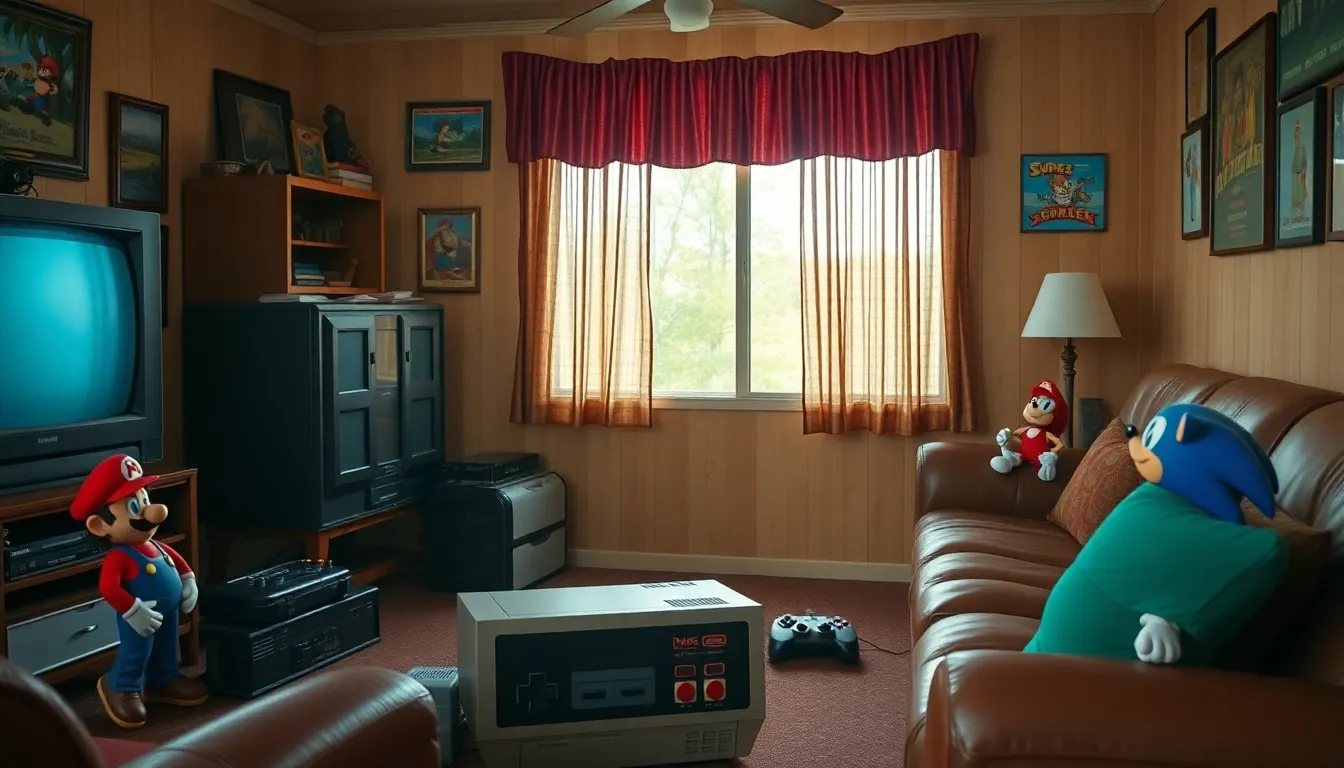Table of Contents
ToggleIn the ever-evolving world of gaming, console exclusive debates are like the ultimate showdown between old-school rivals. Picture a heated argument over pizza toppings, but instead of pepperoni versus pineapple, it’s PlayStation versus Xbox, each claiming to have the superior lineup. Gamers are fiercely loyal, often defending their chosen platform as if it were a beloved pet, while others sit back and enjoy the spectacle.
These debates spark passion, laughter, and sometimes a few eye rolls, as players argue over which console reigns supreme. With exclusive titles that can make or break a system’s reputation, the stakes are high. So grab your controller and settle in as we dive into the amusing and sometimes absurd world of console exclusive debates, where every opinion counts and every game is a battleground for bragging rights.
Overview of Console Exclusive Debates
Console exclusive debates capture the attention of gamers across platforms like PlayStation, Xbox, and Nintendo. These discussions center on the value and impact of titles exclusive to specific consoles, shaping perceptions of each platform’s strength. Gamers often express loyalty to their favored brands, reinforcing identities tied to their gaming experiences.
Signature titles, including “The Last of Us” for PlayStation or “Halo” for Xbox, exemplify how exclusive games can enhance a console’s appeal. Players frequently argue about the merits of these exclusives, reflecting a dedication that transcends mere entertainment. Competitive spirit drives gamers to defend their choices vigorously, intensifying the discourse.
Diverse opinions contribute to an entertaining atmosphere, marked by humor and camaraderie. Memes and social media posts amplify these debates, showcasing a shared culture among gamers. Community reactions to exclusive announcements reveal how excitement or disappointment influences brand loyalty.
Public perceptions shift with each new console generation, as the landscape of exclusives evolves. The recent strategies from companies have sparked renewed discussions, emphasizing the importance of exclusive games in attracting players. Momentous releases can secure a console’s success or failure, depending on their reception and critical acclaim.
Gamers engage in spirited discussions, defining their preferences through humor and spirited debate. The essence of these debates lies in the shared passion for gaming, underscoring the lengths to which enthusiasts will go in support of their chosen platform. Through these conversations, the community continues to navigate the intricate world of console exclusivity, with each opinion adding depth to the ongoing narrative.
Historical Context

Console exclusives shape the gaming landscape. Historically, the debate has evolved with the industry.
Early Console Exclusives
The late 1980s and early 1990s marked the introduction of early console exclusives. Titles like “Super Mario Bros.” for the Nintendo Entertainment System created strong brand loyalty. Players associated unique gaming experiences with specific consoles. Sega’s “Sonic the Hedgehog” further exemplified this trend, establishing fierce competition. Both companies utilized exclusives to drive sales and influence consumer choice.
The Rise of Exclusive Titles
As technology progressed, the demand for exclusive titles increased significantly. The era of the PlayStation and Xbox introduced blockbuster games like “Final Fantasy VII” and “Halo: Combat Evolved.” These titles set new standards for gaming experiences and captivated audiences. Companies recognized exclusives as effective marketing strategies, influencing console popularity. Gamers became increasingly passionate, engaging in heated discussions about their preferred platforms. The impact of these exclusive titles continues to resonate, shaping user relationships with consoles.
Major Players in the Console Exclusive Debates
Console exclusive debates center on three major players: Sony PlayStation, Microsoft Xbox, and Nintendo Switch. Each platform maintains a unique portfolio of exclusive titles that shapes gamer loyalty and preferences.
Sony PlayStation
Sony PlayStation leads with a strong lineup of exclusive games. Titles like “The Last of Us,” “God of War,” and “Spider-Man” demonstrate its commitment to storytelling and immersive gameplay. These exclusives not only enhance brand loyalty but also attract new gamers seeking quality experiences. Continuous investment in top-tier game development establishes PlayStation as a dominant force in the market. Player engagement and community discussions thrive around these beloved franchises, further fueling passionate debates.
Microsoft Xbox
Microsoft Xbox holds its ground with iconic exclusives that define its brand. “Halo,” “Forza,” and “Gears of War” showcase the platform’s focus on multiplayer experiences and innovative gameplay mechanics. Xbox Game Pass enhances appeal through a subscription service model, providing access to a vast library of games, including many exclusives. This strategy fosters an engaged community drawn to both multiplayer and single-player experiences. As Xbox continues to invest in game development studios, its exclusives maintain relevance in ongoing discussions.
Nintendo Switch
Nintendo Switch captivates gamers with beloved franchises like “The Legend of Zelda,” “Super Mario,” and “Animal Crossing.” These games not only attract newcomers but also instill nostalgia among veteran players. Unique gameplay mechanics and charming aesthetics differentiate Nintendo’s offerings from competitors. The portability of the Switch expands access, allowing gaming anywhere, anytime. This versatility contributes to vibrant discussions in the gaming community, as players share experiences across diverse titles exclusive to the platform.
Impact on Gamers
Console exclusives play a significant role in shaping gamers’ experiences and preferences. These unique titles drive passion and loyalty, influencing both community dynamics and market trends.
Pros of Console Exclusives
Exclusive games enhance brand loyalty among gamers. They create a sense of identity tied to specific consoles, prompting people to align with their favorite platforms. Players enjoy exceptional gaming experiences thanks to unique titles. “God of War” for PlayStation offers storytelling that captivates audiences. Meanwhile, Xbox’s “Halo” franchise provides engaging multiplayer options. Offerings like these encourage players to invest in a console, resulting in a vibrant gaming community. Additionally, exclusive titles often push developers to innovate, leading to groundbreaking gameplay experiences.
Cons of Console Exclusives
Console exclusives can fragment the gaming community. Divided player bases lead to challenging interactions, as many gamers miss out on popular titles available only on specific consoles. Limited access limits opportunities for shared experiences and camaraderie. Many gamers may feel pressured to choose a side, fostering animosity among players. This rivalry can overshadow the enjoyment of gaming itself. Furthermore, the business model might prioritize profit over innovation, resulting in repetitive gameplay styles across titles. As a result, some gamers question whether the exclusivity truly enhances their gaming journey.
Future Trends in Console Exclusives
The landscape of console exclusives is evolving, marked by notable trends that reshape gamer interactions. Gamers increasingly favor cross-platform play, allowing friends on different consoles to enjoy the same games together. This trend reduces barriers among players, fostering camaraderie and cooperation regardless of device preference.
Cross-Platform Play
Cross-platform play is gaining traction among developers and gamers alike. Titles such as “Fortnite” and “Call of Duty: Warzone” exemplify this shift, enabling players from diverse platforms to connect. By prioritizing cross-play capabilities, developers enhance the gaming experience and appeal to a broader audience. Gamers are vocal about their desire for this feature, as it cultivates a welcoming environment and shared enjoyment.
Shifts in Developer Strategies
Shifts in developer strategies also impact the exclusive landscape. Many companies adopt a more flexible approach, focusing on multi-platform releases to reach wider audiences. This strategy includes investing in titles that appeal to gamers across various consoles. As a result, studios align their interests with community desires, creating titles that transcend genre boundaries. This evolution suggests a move toward prioritizing player accessibility and shared experiences over exclusivity.
The debates surrounding console exclusives highlight the vibrant and sometimes contentious nature of the gaming community. Gamers’ loyalty to their preferred platforms fosters a unique culture filled with humor and spirited discussions. As the industry evolves toward cross-platform play and more inclusive gaming experiences, the focus may shift from exclusivity to accessibility.
This transition could bridge divides and enhance shared experiences among players. Ultimately, the passion for gaming and the joy of connecting with others remain at the heart of these debates, proving that regardless of platform preference, the love for gaming unites players in their pursuit of fun and adventure.







